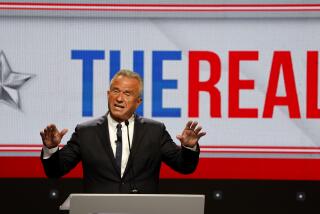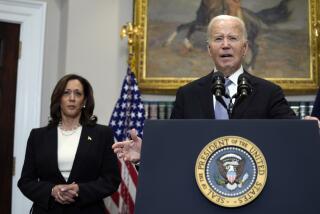Kerry Tries to Hone Criticism of Iraq War
- Share via
CLEVELAND — Sen. John F. Kerry toughened his criticism of the war in Iraq on Monday, calling it the “wrong war in the wrong place at the wrong time.” But President Bush responded by saying the Democrat’s comments were another example of indecisiveness on the issue.
The exchange underscored how the war remains a central issue of the presidential campaign, particularly as the death toll of U.S. troops nears 1,000. Polls show that a majority of Americans question the rationale for the war. But Kerry has struggled at times to distinguish his stance on Iraq from Bush’s, a matter that has bedeviled his campaign for months.
On Monday, Kerry more directly challenged the war’s consequences during a morning forum with residents in Canonsburg, Pa.
“This president rushed to war without a plan to win the peace, and he’s cost all of you $200 billion that could have gone to schools, could have gone to healthcare, could have gone to prescription drugs, could have gone to our Social Security,” the Massachusetts senator said.
“And the fact is when they talk about a coalition [of U.S. and foreign troops], that’s the phoniest thing I’ve ever heard,” Kerry said, “You’ve got 500 troops here, 500 troops there, and it’s American troops that are 90% of the combat casualties, and it’s American taxpayers that are paying 90% of the cost of the war.”
Kerry’s latter comment was a reference to Bush’s claim that the war is being waged by a coalition of 30 countries. Of the roughly 160,000 troops now deployed in Iraq, nearly 88% come from the U.S.
Minutes later, when a man asked him when he would bring U.S. troops home, Kerry said he could do it within four years. Until Monday, the Democratic nominee had said he would seek to bring “a significant number” of troops home by the end of his first term, replacing them with soldiers from European and Arab nations.
“My goal would be to try to get them home in my first term, and I believe that can be done,” Kerry said.
Those remarks prompted Bush and his advisors to do some quick speech rewriting on their way to rural southeastern Missouri, where the president ridiculed Kerry.
“After voting for the war and against its funding, and after saying he would have voted for the war even knowing everything we knew today, my opponent woke up this morning with new campaign advisors and yet another new position,” the president told 10,000 supporters in a field in tiny Poplar Bluff.
“Suddenly he’s against it again,” Bush added. “No matter how many times Sen. Kerry changes his mind, it was right for America then and it’s right for America now that Saddam Hussein is no longer in power.”
Although Kerry engaged in sharp fashion on the war Monday, the exchange was not exactly what his campaign had in mind for the day’s debate. Kerry’s advisors had hoped to focus attention on Bush’s claims that jobs are coming back, releasing a report showing that the new jobs feature low pay and meager benefits.
Democrats are worried because a series of new polls suggest the president has opened a lead after months of a race that many say has been a statistical tie -- evidence that Bush secured momentum from last week’s Republican National Convention.
Surveys for Time and Newsweek published this week gave Bush an 11-point lead over his Democratic challenger.
A new poll released Monday, conducted by Gallup for CNN and USA Today, showed a narrower race, but with Bush maintaining a 7-point lead among likely voters, 52% to 45%. Among registered voters, Bush leads 49% to 48%. The poll’s margin of error is plus or minus 3 percentage points.
The numbers show that, despite a Democratic National Convention last month devoted almost entirely to neutralizing the GOP’s advantage on war and national security by brandishing Kerry’s credentials as a decorated war hero, the Democratic nominee has in fact lost ground with voters on those fronts.
Fifty-four percent of Gallup respondents think Bush is better equipped to handle the war, compared with 41% for Kerry. On the larger question of which candidate is more capable of handling the war on terrorism, Bush leads 61% to 37%.
Bush strategists specifically cite Kerry’s mixed signals on Iraq for giving voters reason to question his ability to lead.
Both Bush and Vice President Dick Cheney on Monday seemed to relish the chance to hit Kerry again on the issue of Iraq. Cheney attacked Kerry in personal terms in Iowa.
“Demeaning our allies is an interesting approach for someone seeking the office of the presidency,” Cheney told supporters. “When it comes to diplomacy, it looks like John Kerry should stick to windsurfing.”
Bush seemed to target Kerry’s remarks on bringing troops home, tying the wars in Afghanistan and Iraq together as ideological efforts by the U.S. to spread democracy.
“We’ll help them move toward elections, we’ll get them to the path of stability and democracy as quickly as possible, and then our troops will return home with the honor they have earned.”
Kerry’s advisors insisted that he had not changed his position on Iraq, and during a stop Monday evening in Cleveland, the candidate fired back again.
“When it comes to Iraq, I would not have done just one thing differently,” Kerry added. “I would have done everything differently than this president. Of all of George Bush’s choices, the most catastrophic one is the mess that he put us in Iraq.”
Kerry has repeatedly criticized Bush’s handling of the war, but has had trouble explaining why he gave the president the authority to invade Iraq in 2002.
Last month, Kerry befuddled allies when he said that he still would have given Bush authority to invade even if he had known there were not weapons of mass destruction as the administration and intelligence officials had said.
In recent days, Kerry’s campaign has tried to turn the focus of the campaign to domestic issues such as unemployment and healthcare that they say represent the administration’s vulnerabilities.
The new message has been crafted, in part, with the help of advisors to President Clinton. Joe Lockhart, the former White House press secretary, and Joel Johnson, a former Clinton advisor, have taken over much of the campaign’s communications strategy. Other onetime Clinton aides such as pollster Stanley Greenberg have taken on more prominence as informal advisors.
On Saturday night, Clinton himself gave Kerry extensive advice about campaign strategy, speaking to the candidate from his hospital bed as he prepared to have coronary bypass surgery.
And Kerry, who campaigned in Pennsylvania, West Virginia and Ohio Monday, tried to heed the advice. He spent most of Labor Day assailing Bush’s domestic policies and accusing the president of abandoning the American worker.
While Bush bragged once again Monday about creating 1.7 million jobs over the last year -- including 144,000 new jobs last month -- the Kerry campaign responded with a report that many of those jobs offer low pay and inadequate benefits.
Bush drew cheers from the crowd in Poplar Bluff, Mo., when he said the nation’s unemployment rate has dropped to 5.4%, but Kerry aides replied that the drop was because fewer Americans were looking for work.
The Democrat showcased new rhetoric to crystallize his assessment of the Bush administration, declaring that the president’s middle initial stood for “wrong.”
“Wrong choices, wrong judgment, wrong priorities, wrong direction for our country,” Kerry told hundreds of coal miners at a barbecue in Racine, W.Va.
Bush also took some time to talk about domestic matters, continuing to promise that a second term would bring major changes to the nation’s tax laws, designed to simplify paperwork at tax time.
“The tax code weighs heavily on our economy and every American family,” he said. “Sitting down to do your taxes shouldn’t require wading through more than 1 million words worth of complicated rules and regulations.”
The president did not mention the idea Monday, but he told a crowd on Saturday in Ohio that a flat income tax is “one option” for fixing the tax laws. Critics say it would unduly harm lower-income workers while lessening the burden on the wealthy.
Gold reported from the campaign trail with Kerry; Wallsten with Bush. Times staff writer James Gerstenzang contributed to this report from the campaign trail with Cheney.
More to Read
Get the L.A. Times Politics newsletter
Deeply reported insights into legislation, politics and policy from Sacramento, Washington and beyond. In your inbox twice per week.
You may occasionally receive promotional content from the Los Angeles Times.










